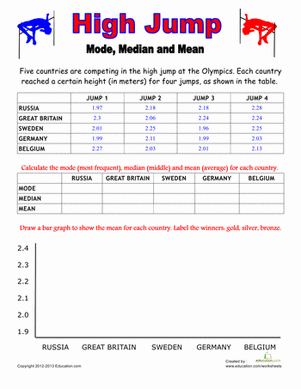Science project
Who can Jump the Highest?
Grade Level: 9th to 10th; Type: Sports Science
Objective:
This project determines who, on average, can jump higher, boys or girls, younger people or older, and how these two factors, gender and age, interact with one another.
Research Questions:
- Does gender play an important role in how high a person can jump?
- Does age play an in important role in how high a person can jump?
- Does the gender factor change with age?
Most people would probably guess that for physical activities such as running, jumping and sports that boys are more advanced than girls. The purpose of this experiment is to determine whether gender plays a role in physical prowess and, if so, if differences are consistent across age ranges.
Materials:
- Long sheets of paper
- Tape
- Measuring tape or stick
- Markers
- About 10 boys and 10 girls: try to make sure you have equivalent ages and approximate heights in both male and female categories. (For example: try to find a boy and a girl that are both twelve years old and about the same height.)
- Notebook and pencil to record observations
Experimental Procedure:
- Place the paper vertically on a stable wall and secure with tape.
- Mark measurements along the paper according to height in inches or centimeters. Make it go up to about 8 feet from the ground.
- Measure the height of each person, and measure how high they can mark on the paper while standing still. (Make sure each person holds the marker in the same place on the marker).
- Have each person jump as high as they can, marking the paper at the highest point in their jump (still holding the marker in the same place). Allow 3 tries each. Record the highest mark for each person.
- Measure the difference between the standing mark and the highest jumping mark. This is the height each person jumped.
- Create a chart and determine overall whether boys or girls jump higher (use average or mean over all numbers for each gender). Also determine what effect age has on height of jump.
Terms/Concepts: Differences in physical ability over gender and age differences, using mean and/or averages in determining a conclusion, charting data and results
Education.com provides the Science Fair Project Ideas for informational purposes only. Education.com does not make any guarantee or representation regarding the Science Fair Project Ideas and is not responsible or liable for any loss or damage, directly or indirectly, caused by your use of such information. By accessing the Science Fair Project Ideas, you waive and renounce any claims against Education.com that arise thereof. In addition, your access to Education.com's website and Science Fair Project Ideas is covered by Education.com's Privacy Policy and site Terms of Use, which include limitations on Education.com's liability.
Warning is hereby given that not all Project Ideas are appropriate for all individuals or in all circumstances. Implementation of any Science Project Idea should be undertaken only in appropriate settings and with appropriate parental or other supervision. Reading and following the safety precautions of all materials used in a project is the sole responsibility of each individual. For further information, consult your state's handbook of Science Safety.













